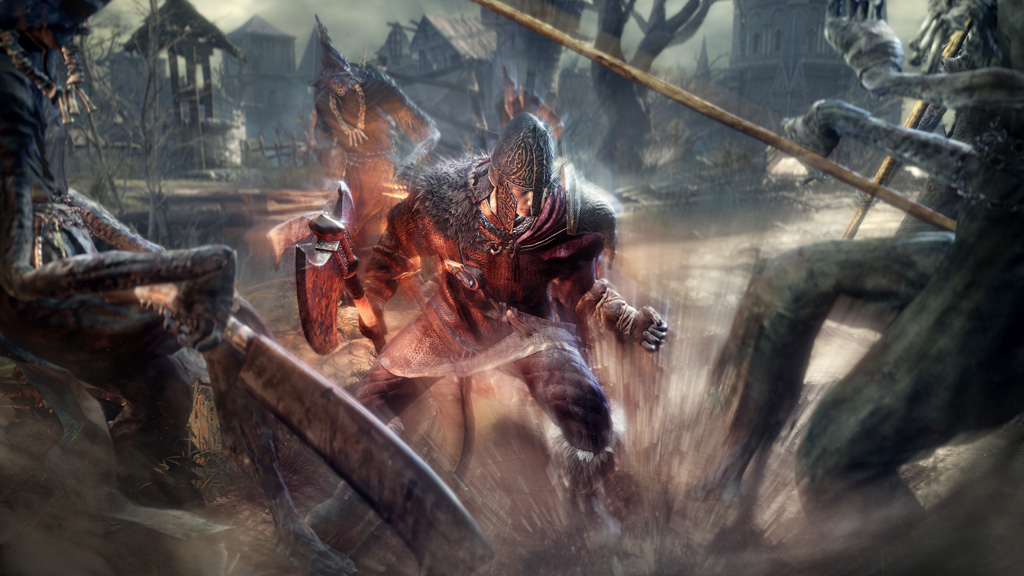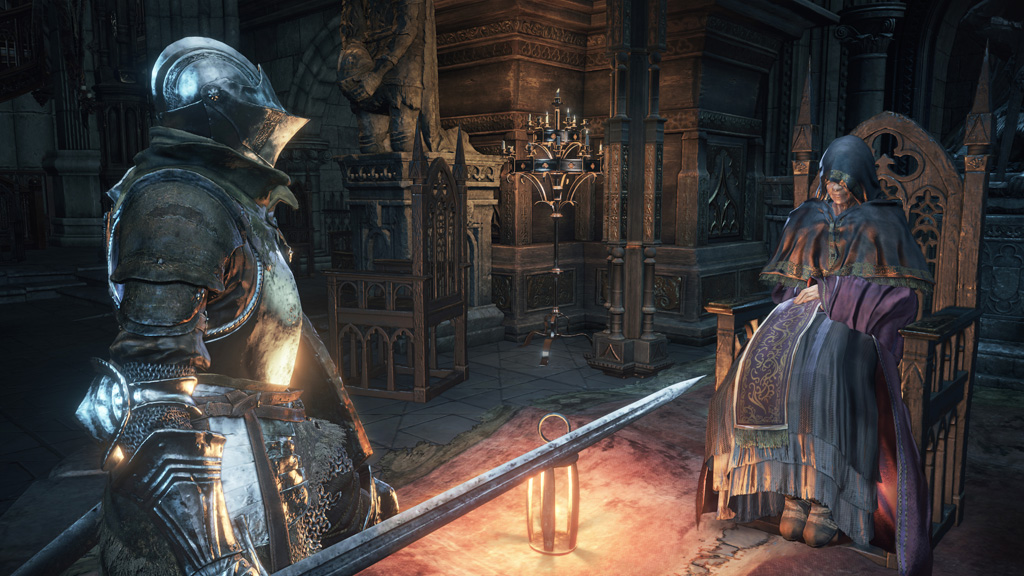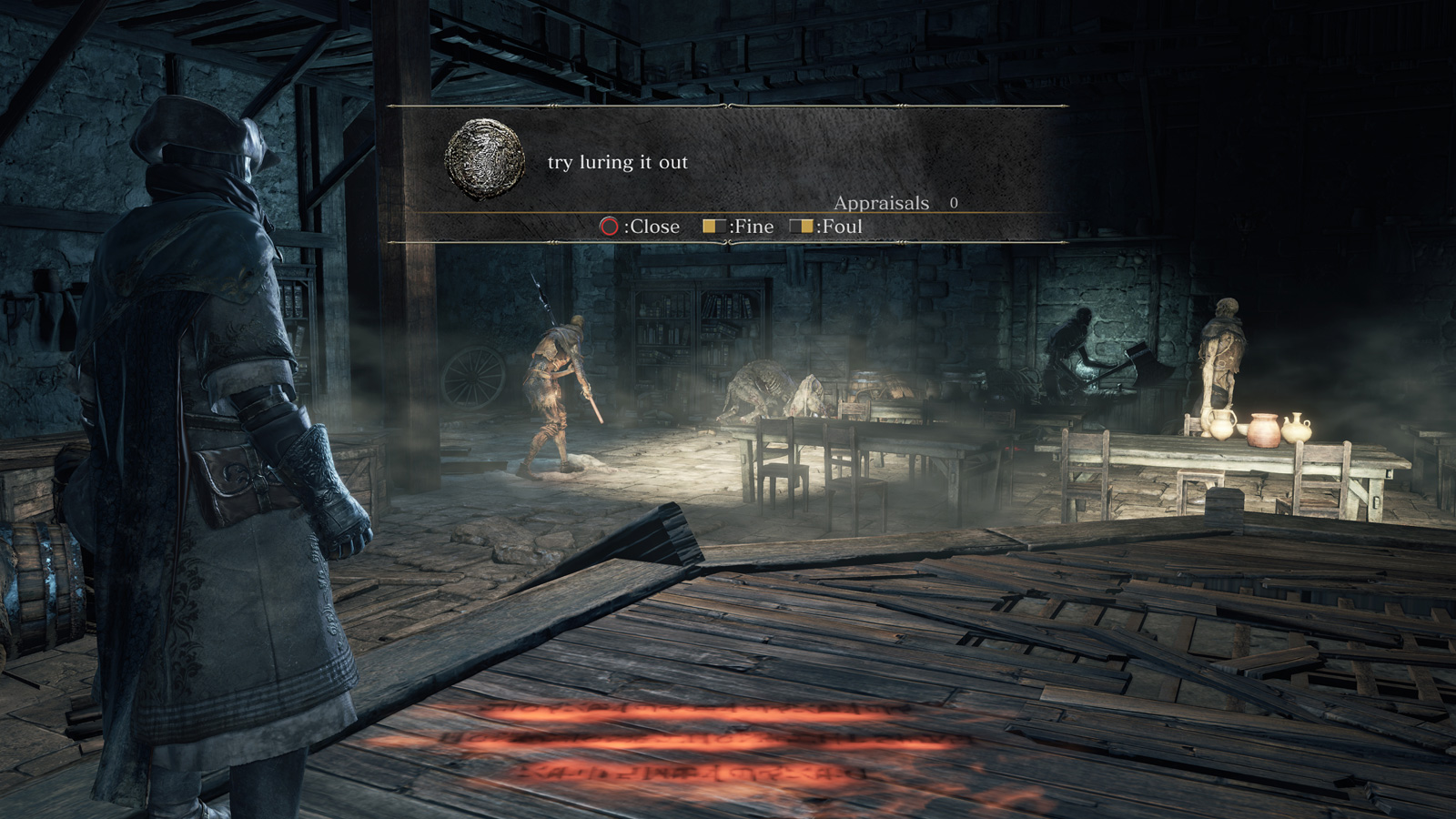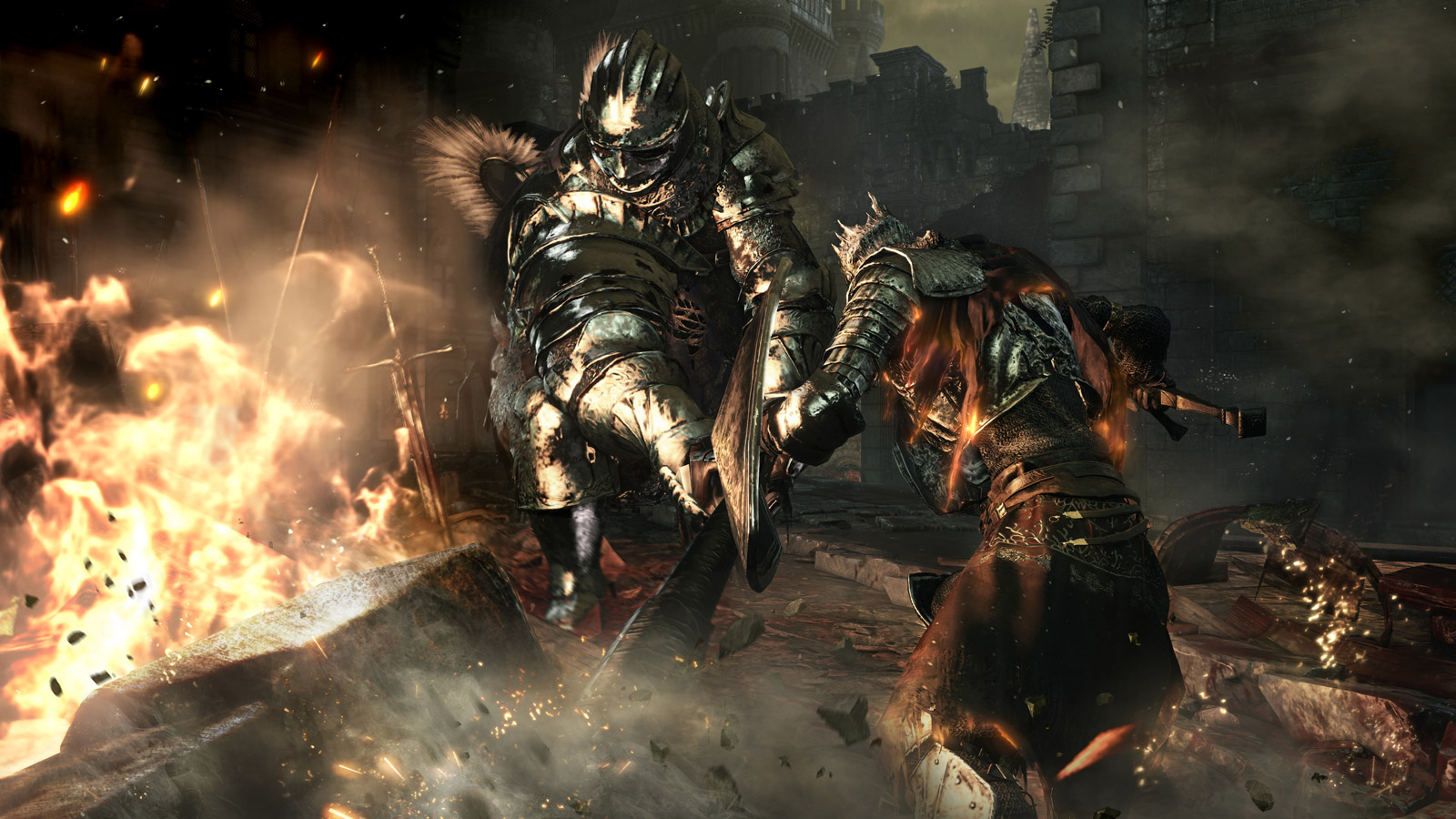Dark Souls III: Tips for New Players
For newcomers to the Dark Souls series, here's a list of helpful tips to make you say "Praise the Sun!" rather than "Despair ahead."
Dark Souls III is here, and you're finally ready to take your first tentative steps into the acclaimed series. You know it's hard, but lots of games are hard. And that's never daunted you before, right? Surely, with a little gaming know-how and a dash of luck, you'll conquer —
You're already dead, aren't you?

Well, it's nothing to be ashamed of. Death in Dark Souls III isn't a failure state; it's a vital part of the experience. The game can punish even minor mistakes in disproportionate ways, but the upshot is that you probably won't make the same mistake more than a few times. Even for experienced gamers, Dark Souls III can be a kick in the gut, but if you play your cards right, it can be a bloodthirsty demon's gut, and not yours.
Veteran players can rest easy: Dark Souls III is not very different from Demon's Souls, Dark Souls, Dark Souls II or Bloodborne, and all of the same rules apply. But if this is your first foray into the series, here's a list of helpful tips to make you say "Praise the Sun!" rather than "Despair ahead."

1. Choose a starting class that suits your play style.
One of the things that make Dark Souls III great is that your starting class doesn't lock you into a particular play style. Start as a warrior, and you may find that you want to sink all of your points into spell casting later — and that's OK. You can change all of your equipment and even redistribute your stats. But while your class won't define your entire experience, it will define your first few hours.
Not every class is equally easy to play. Deprived, for example, is a very tough choice for newcomers, because you start out with no equipment, low stats and only the most rudimentary weapon.
MORE: Dark Souls III Review: Advanced Dungeons and Dragons
Warrior and Knight are both solid choices, as they focus on straightforward melee combat. Their heavy armor makes them somewhat resistant to damage, and their high health makes them durable. The Thief begins with a bow, making him the ideal choice for ranged characters. The Pyromancer is probably the easiest of the magic classes to play, because early on, you meet a Pyromancy trainer who can teach you a variety of spells and help you upgrade relevant equipment.
Still, any class is a viable choice, provided that you're willing to put in some effort. Remember to check each character's equipment as well as his or her stats, as not all equipment is easy to find or buy later on.

2. Explore everything.
Dark Souls III will throw a ton of difficult enemies your way in each stage, so it may be tempting to take a straight path from one bonfire to the next, fighting only the enemies that you can't avoid. Resist this temptation. In addition to uncovering bits of lore and encountering some gorgeous views, exploring each area to its fullest has manifold gameplay benefits. The multitude of souls you'll acquire to upgrade your stats and equipment are a good start, for example.
Even taking just a few steps off the beaten path could result in a helpful item, from a simple detoxicant to an entire set of armor. Dark Souls III has more weapons and armor than you can shake a magical spear at, and most of them don't come from the game's few shops.
Speaking of shops, vendors don't come out of nowhere. Exploring each area will yield magical trainers who will join your home base in the Firelink Shrine, as well as items they can use to expand their repertories. (Ditto for the blacksmith's magical coals, for sword-and-shield types.)
Finally, bonfires aren't the only way to mark your progress in Dark Souls III. There are also tons of hidden shortcuts, from inactive elevators, to half-extended ladders, to locked doors that open only from one side. Finding a shortcut can mean the difference between having instant access to a tough boss and having to slog through an entire level first.
Be sure to watch out for hidden paths and illusory walls, too. Check over ledges to see if you can survive a fall, try out unusual gestures at appropriate locations and feel free to strike any suspicious-looking dead ends with a sword. You'll be amazed by what you might find.

3. Try whatever gear you find.
Like your mother always said, "How can you know you don't like something if you don't try it?" Every sword, shield, spear, ax, bow, crossbow, magic spell and enchanted ring works a little differently in Dark Souls III, and every set of armor comes with a unique collection of benefits and drawbacks. Experienced players probably know what they'll like, but if you're just joining the Souls series, you owe it to yourself to see what works best for you.
Just be aware that not every piece of gear will mesh with your stats. Every piece of equipment has a minimum requirement for stats like strength, dexterity and intelligence, so if you don't meet them, you're better off not using that piece of equipment at all. You'll know an unusable item when you see it; the game will highlight one of the required stats in red rather than white.
Trying out new weapons and armor can be particularly useful for tough boss fights. Using a slow, ponderous greatsword won't do you any favors against a fast, nimble boss, while an enemy that spews lightning at you won't be much of a threat after you equip armor and a shield with lightning resistance.

4. When in doubt, cooperate.
Dark Souls III is a harsh game, but there's no reason to go it alone. The title has both synchronous and asynchronous multiplayer modes, and while the former can help you out in a pinch, the latter will save your life almost every time.
First off, be sure to play Dark Souls III online. (The game will automatically log in to Dark Souls III's servers upon launch unless you specify otherwise.) If you play offline, you won't be able to communicate with other players, or summon them when you're in need. (You can sometimes summon nonplayer characters for tough bosses, if you seek them out and chat them up first.) While online functionality is free on the PC, it requires a subscription to either PlayStation Plus or Xbox Live Gold on the consoles.
If you're struggling with a boss, don't be afraid to call on other players for help. Simply consume an Ember; then look for summon signs outside of the boss chamber. Helpful players can offer their assistance with the White Soapstone item, and they've probably already beaten the boss who's giving you trouble. Though you won't be able to simply sit back and let another player do all of the work, any competent player can help you defeat a boss, as few bosses are equipped to handle multiple players.
(You may even consider paying the favor forward after your victory, considering that beating bosses gives you extra souls, restores your Ember and can help you gain renown within your faction.)
Even more helpful than cooperative boss fights are the many messages that players can leave for one another. By accessing the Start menu, you can write messages with a number of templates, such as "ABC ahead" or "Try XYZ." You can vote helpful messages favorably, which means they'll not only stick around, but also completely refill the author's health bar. This means that if you write messages, you could find yourself bailed out in the middle of a tough boss fight or after you've exhausted your health potions while exploring. And, of course, if you read the messages, you can find all manner of traps, pitfalls, hidden enemies and boss strategies before you ever fall victim to them yourself.

5. Don't go hollow.
If you find yourself in a particularly tough stretch of the game, you may find a message that reads, "Don't give up." On message boards, players say, "Don't go hollow." This is a phrase that gamers have been using to encourage one another since the first Dark Souls game. If you "go hollow," in game terms, you lose your humanity and become one of the mindless undead. No matter how tough the game gets, or how impossible things might seem, don't go hollow. You can do it.
Unless you're a Dark Souls prodigy, you'll probably encounter at least one or two bottlenecks during your play-through — spots that, no matter how many times you try, crush you again and again. There won't be any obvious solution, and there won't be any way to bypass them. This frustration is a feature, not a bug. Occasionally finding yourself stuck is an intrinsic part of the game, if only so that you can feel a sense of triumph when you struggle past it and find that it wasn't impossible after all.
MORE: Dark Souls III: Everything You Need to Know
If you find yourself stuck, ask yourself: Have I really tried everything? Have I upgraded my equipment recently? Is there another area I can tackle first? What other weapons and armor could I employ? Do I need to level up my stats more before trying again? Are there any co-op partners who can help me? If all else fails, it really never hurts to step away from the game for a few hours and clear your head before trying again. During that time, you can check out wikis, message boards and YouTube strategy guides for the troublesome spot. Someone else has gotten through this area; you can, too.
While these tips should prove useful for new players, all you really need to succeed in Dark Souls III are patience and determination. When, at long last, you stand triumphant over the final boss, you may feel sorry — not relieved — that your journey has come to an end.

Bonus Tip: Don't lower your shield.
Let me repeat that for emphasis: Don't lower your shield. This isn't a numbered tip because it won't apply to everyone, but if your play style incorporates a shield, keep it up whenever you're exploring. I can't begin to describe how many times, over the course of various Souls games, I've assumed I'd see an enemy coming and advanced at full sprint with my arms flapping in the breeze. Sometimes, this strategy works fine. Sometimes, you get pounded flat by a rolling boulder, or an enemy jumping off a ledge, or a flaming arrow that comes out of nowhere. There's basically no risk in using a shield (except that your stamina regenerates a bit slower) and potentially tons of reward, so don't gamble in an unexplored area.
Sign up to get the BEST of Tom's Guide direct to your inbox.
Get instant access to breaking news, the hottest reviews, great deals and helpful tips.
Marshall Honorof is a senior editor for Tom's Guide, overseeing the site's coverage of gaming hardware and software. He comes from a science writing background, having studied paleomammalogy, biological anthropology, and the history of science and technology. After hours, you can find him practicing taekwondo or doing deep dives on classic sci-fi.

